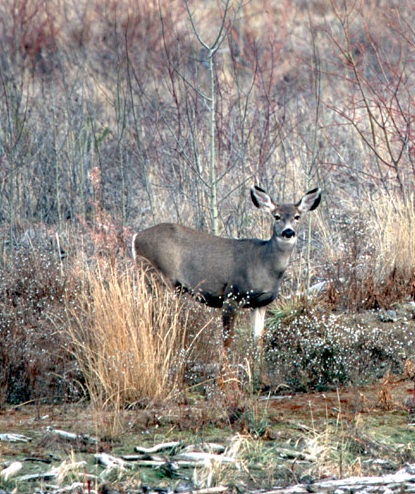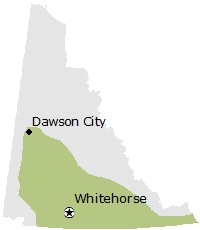
Credit: Cameron Eckert
Name
- Common name: Mule Deer
- Including: White-tailed Deer (Odocoileus virginianus)
- Scientific name: Odocoileus hemionus
- Order: Artiodactyla
- Family: Cervidae
Also known as
Black-tailed deer
Viewing opportunities
- Mule deer prefer open grassy areas and are most often seen along roadways, in fields and on grassy south-facing slopes.
- Though found as far to the north as Dawson, most sightings are along the highways of the southern Yukon.
Description
- Medium size deer with tan fur and white rump patch.
- Tail has black tip.
- Large mule-like ears that move independently.
- Dark forehead contrasting with light face and upper neck.
- Antlers are forked.
A few White-Tailed Deer, Odocoileus virginianus, also occur in the Yukon. They can be distinguished from the more common Mule Deer by their branching antlers, a lighter over-all colour, and the belly, throat, chin, and dark rump. The underside of their tail is white but can only be seen when the tail is raised.
Fast facts
- Height: 1 m
- Weight: Males weigh around 104 kg and females weigh around 65 kg
- Lifespan: 4 to 10 years
- Predators: Bears, wolves, Cougars, Coyotes
- Habitat: Aspen parklands, grassy slopes
Conservation status
- Yukon: S3S4 (Vulnerable/Apparently Stable)
- Global: G5 (Secure)
Yukon population estimate
Not determined.
Behaviour
Mule Deer are most active at dawn and dusk. During mating season, bucks will push antlers together and try to force the other male’s head down until they surrender. The Mule Deer’s slender legs are not well adapted to travelling through deep snow so they stay close to south-facing slopes and other wind-swept areas in winter.
Diet
Grasses and forbs, foliage and twigs.
Distribution

Sights and sounds
env-mule-deer-audio.mp3
Males make grunting calls during rut.

Mule Deer track: 8.2 x 6.6 cm.
Deer and people
- Mule Deer hunting opportunities are limited in the Yukon. Only a few permits for hunting deer are issued each year.